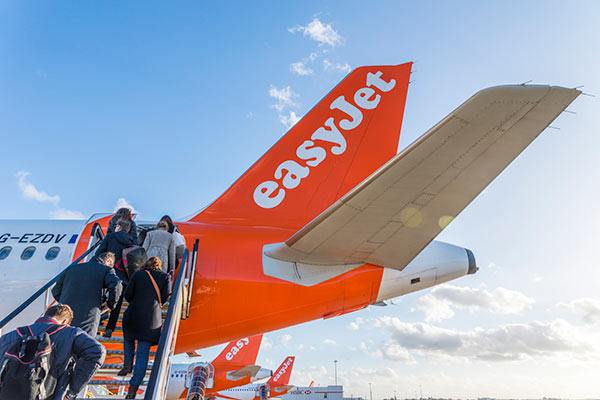ii view: easyJet focused on delivering another record summer
Expanding the number of routes to fly and also growing its holiday business. We assess prospects for this low-cost European airline.
3rd June 2024 11:56
by Keith Bowman from interactive investor

First-half results 31 March
- Revenue up 22% to £3.27 billion
- Loss before tax of £350 million, down from a loss of £411 million
- Net cash of £146 million, up from net debt of £485 million as of 31 December
- No interim dividend payment
Guidance:
- Expects slightly improved Revenue Per Seat (RPS) during third quarter compared to Q3 last year
- On track to deliver medium term target of more than £1 billion of pre-tax profit
Chief executive Johan Lundgren said:
"easyJet's targeted growth and focus on productivity has delivered a reduction in winter losses, boosted by our trusted brand and network that we continue to invest in.
"We are now absolutely focused on another record summer which is expected to deliver strong FY24 earnings growth and are on track to achieve our medium-term targets."
- Invest with ii: SIPP Account | Stocks & Shares ISA | See all Investment Accounts
ii round-up:
easyJet (LSE:EZJ) is a short-haul European airline operating a fleet of 343 Airbus jets with an average of 180 seats per plane. Just over half of its aircraft are owned and the rest leased.
The Luton headquartered company operates 1,045 routes to 36 countries between 158 airports.
For a round-up of these latest results announced on 16 May, please click here.
ii view:
Started in 1995, easyJet flew 82.8 million passengers during its last financial year to late September 2023, up from the prior year’s 69.7 million. The UK generates its biggest slug of sales at just over a half, followed by Southern Europe at close to a fifth, with France, Switzerland and Northern Europe all generating around a tenth each. In early 2025, current chief financial officer Kenton Jarvis will replace existing chief executive of the last seven years Johan Lundgren.
Group strategy includes building Europe’s leading route network and transforming its revenue streams through increased ancillary sales such as cabin bags and expanding its easyJet holidays business in partnership with hotels such as Accor SA (EURONEXT:AC) and InterContinental Hotels Group (LSE:IHG).
For investors, heightened geopolitical tensions in the Middle East involving Israel and potential for the war in Ukraine to spread cannot be ignored. Elevated borrowing costs pressuring disposal income could yet see some consumers paring back travel plans, costs generally remain elevated, while the many other factors outside of management’s control such as bad weather and occasional strikes by pilots and air traffic control warrant consideration.
- The Week Ahead: British American Tobacco, B&M, WH Smith
- FTSE quarterly reshuffle: changes to FTSE 100 guaranteed
- Insider: heavy buying and selling of these FTSE 100 shares
On the upside, buoyant demand in the wake of the pandemic has seen first-half losses reduce and customer numbers for the relatively new holiday business climb 42% year-over-year. Previous net debt has turned to net cash, while a return to dividend payments has been made, leaving the shares offering a forecast dividend yield of over 2.5%.
In all, and while the many factors that can hinder performance arguably make airlines higher risk, ongoing management confidence in achieving its medium-term goal of £1 billion-plus profit appears grounds for optimism.
Positives:
- Growing its holidays business
- Strong focus on costs
Negatives:
- Uncertain geopolitical and economic outlook
- Many factors outside of management’s control can hinder performance
The average rating of stock market analysts:
Buy
These articles are provided for information purposes only. Occasionally, an opinion about whether to buy or sell a specific investment may be provided by third parties. The content is not intended to be a personal recommendation to buy or sell any financial instrument or product, or to adopt any investment strategy as it is not provided based on an assessment of your investing knowledge and experience, your financial situation or your investment objectives. The value of your investments, and the income derived from them, may go down as well as up. You may not get back all the money that you invest. The investments referred to in this article may not be suitable for all investors, and if in doubt, an investor should seek advice from a qualified investment adviser.
Full performance can be found on the company or index summary page on the interactive investor website. Simply click on the company's or index name highlighted in the article.